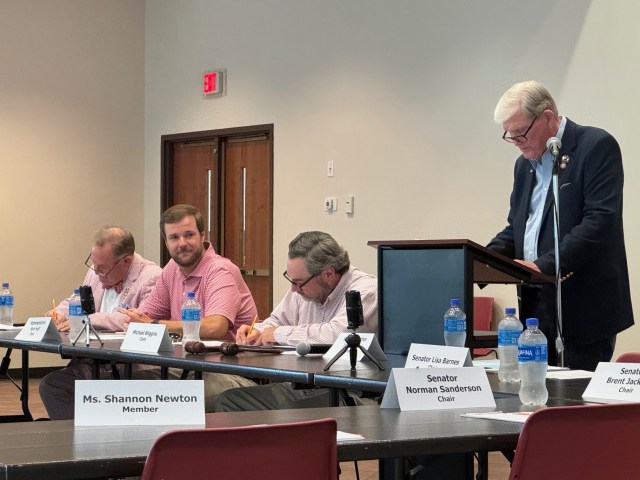— SPEAKER MAY BACK VOTING PROVISION: Via The Hill: “Hard-line conservatives expect Speaker Mike Johnson will embrace their favored tactic by bringing a stopgap bill to the House floor next week that includes a proof-of-citizenship voting bill and would extend government funding into 2025. Such a move would not only grant a win to the House GOP’s conservative wing, but would tee up a showdown with the Democratic-controlled Senate and White House, which both object to the voting bill. Congress faces a Sept. 30 deadline to prevent a shutdown.”
— JNK KEEPS BEATING INFLATION DRUM: Both locally and nationally, U.S. Sen. John Kennedy can’t stop talking about inflation and the role Vice President Kamala Harris has played. Last week, Kennedy visited his hometown to speak to the Zachary Rotary Club and hit his talking points. “Louisianans get up every day and work hard, but thanks to the Biden-Harris administration’s inflation, the American dream is becoming impossible for families to achieve. Our people deserve better than that,” Kennedy during his Rotary speech. On average, Kennedy told the crowd inflation has cost Louisiana households $23,954 since 2021, and prices for all consumer goods are now 21 percent higher in Louisiana than when the Biden Administration took over. Appearing a few days later on Fox News, Kennedy added, “In America today, it is harder than ever to get ahead. And it is easier than ever to do nothing. I still think the economy, inflation, and this campaign is going to be the main issue. Joe Biden and Kamala Harris have been inflation machines. What is Ms. Harris’ plan to reduce prices? She doesn’t have one.”
— GRAVES HELPS AIRPORTS SOAR: Congressman Garret Graves, chairman of the House Subcommittee on Aviation, is helping steer $51 million awarded to Louisiana airports by the Federal Aviation Administration. More than 55 percent, or $28 million, is dedicated to airports represented by Graves. “The safety and resilience of Louisiana airports is critical to passenger safety, economic development, business growth, and builds on the billions in federal funding we’ve secured in infrastructure investments,” Graves said. “As I keep saying, we’re running through the tape, and we won’t complete this term without exhausting all our energy on securing wins for our great state.” Funding in the district went to Baton Rouge Metro Airport, Houma-Terrebonne Airport and Harry William Memorial Airport.
— LETLOW MAINTAINING FOCUS ON MILITARY: As federal lawmakers prepare to return to Capitol Hill next week, Congresswoman Julia Letlow said she’s standing by her promise to honor current and former military in this year’s Defense Appropriations Act. The legislation, which Letlow helped mold as an Appropriations member, includes a 4.5 percent pay increase, among other provisions. “I will always work to make sure our veterans are taken care of and shown the respect that they deserve,” said Letlow.
— CARTER DELIVERS FOR NEW ORLEANS EAST: Congressman Troy Carter is finally seeing the fruits of 17 federal awards he has championed for New Orleans East and the 9th Ward. These grants focus on environmental justice, community and economic development, and building stronger, more resilient infrastructure. “Before being elected congressman, I spent a great deal of time listening to the needs of our communities as a state legislator and city councilman. Here in New Orleans East and the Lower 9th Ward, I heard about a lack of recreational activities and infrastructure investment, as well as a feeling that these areas were not prioritized for disaster recovery,” said Carter. “Today is just the beginning, these projects will require ongoing collaboration and commitment from every one of us. We have shown that working together makes incredible things possible.”
— CASSIDY RESPONDS TO WSJ DRILLING OP-ED: Via Fox Business: “Federal courts and the climate lobby are waging ‘war’ on the American oil worker by blocking fracking permits, Louisiana Sen. Bill Cassidy told FOX Business in response to a recent piece from the Wall Street Journal editorial board on Tuesday. The WSJ article homed in on restrictions placed on offshore drilling, emphasizing, in particular, a recent court ruling from Federal Judge Deborah Boardman which could, in their words, ‘stop almost all offshore oil production in the Gulf of Mexico.’ ‘When the courts do these actions. They are against the American worker. They are against the American economy. They’re also, by the way, since U.S. natural gas helps lower global greenhouse gas emissions. They’re against the world environment. And they also say they’re against our allies because our gas supports countries like Germany. It’s overactive courts doing a heck of a lot of damage,’ Cassidy told Stuart Varney.”
— SCALISE UNIMPRESSED WITH ANTI-ISRAEL VOICES: Via Fox News: “House Republican leaders are vowing to push back on anti-Israel protests that are once again taking over college campuses as students return for the fall semester. It comes as activists have already begun defacing property and staging demonstrations at Columbia University in New York City, which was a hotbed of controversial activity in the spring. ‘There should be a zero tolerance policy for antisemitic violence on campus that targets Jewish students. If universities won’t hold protestors accountable, Congress will,’ Majority Leader Steve Scalise told Fox News Digital. ‘Just last month, we subpoenaed several Columbia University officials, and we will continue our investigations and take action on the floor as students return to campus.'”



 Save the Date
Save the Date
